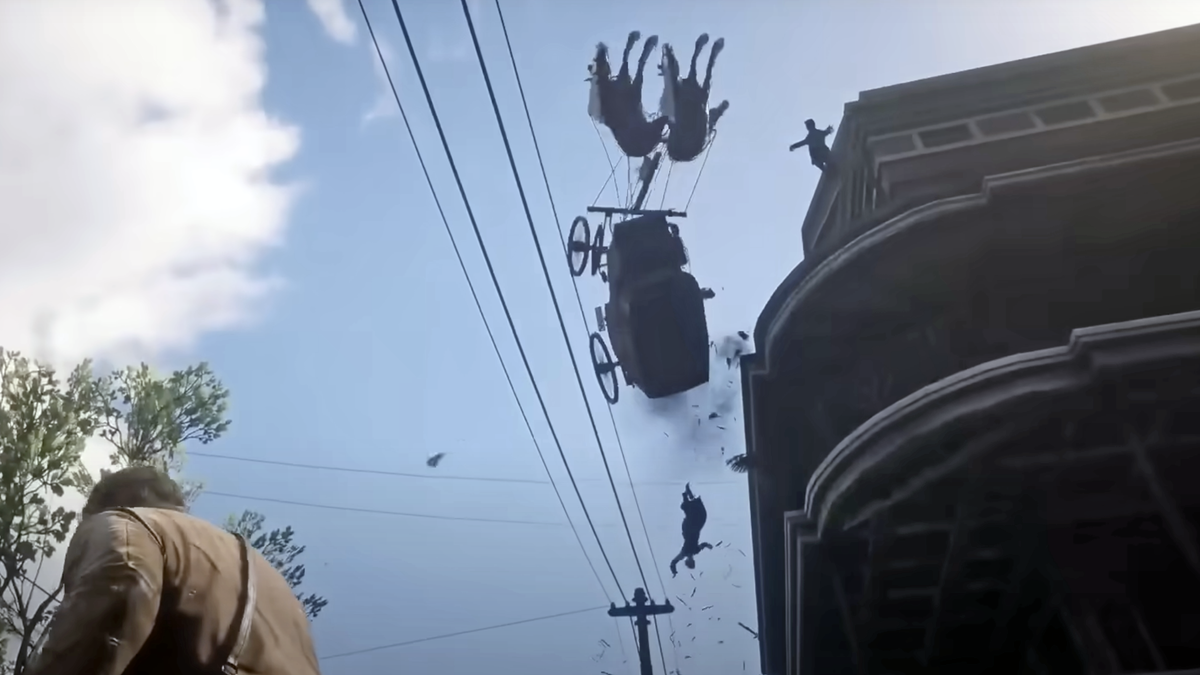SPOILER ALERT! This post contains details from the series finale of Superman & Lois.
The CW bid farewell to Superman & Lois on Monday night with an epic finale that not only closed the chapter on Lex Luthor’s terror over Smallville but also gave audiences a glimpse at the lives their favorite characters would go on to lead.
The intense first half of the episode saw Clark (Tyler Hoechlin) go toe-to-toe with not only Michael Cudlitz’s Lex Luthor but also defeat Doomsday, with the help of his sons Jordan (Alexander Garfin) and Jonathan (Michael Bishop). The pair join forces to save their father from the brink of death as Doomsday pummels Superman into the pavement, luring the killing machine away so that Superman can formulate his plan to launch Doomsday into the sun.
But rather than dwell in the aftermath of the fight, showrunners Todd Helbing and Brent Fletcher opted to do something that few, if any, Superman properties have — showing the hero living out the rest of his days.
After Clark died earlier in Season 4, he received a heart transplant from his father-in-law, essentially ensuring his mortality. In Superman & Lois finale, audiences see Clark hanging up his cape in favor of championing the systemic issues in his community, while also watching his sons start their own families. Lois’ cancer eventually returns, and after she passes, Clark lives out the rest of his days with a canine companion before his heart gives out in the final moments of the episode and he is reunited with the love of his life.
In the interview below, Helbing and Fletcher spoke with Deadline about the ambitious series finale and giving Superman a proper ending.
DEADLINE: What were some of your goals overall with Season 4, and how did you set out to accomplish them with just 10 episodes?
TODD HELBING: Obviously, we initially thought we would go a little bit more, but it gave us an opportunity to really tell a succinct story. The whole show, from the beginning, the big theme is family. So we wanted to start out this the season at Death of Superman. We knew it was going to get pretty dark, but slowly start to inject the light into it and really see what what Superman stands for, what Lois Lane stands for, and what the family stands for. It was such a joy to have Michael Cudlitz as Lex Luthor, and he was such a good villain to have opposite family with the final season. As this family unit grows and as a secret is exposed, Smallville comes to [Superman’s] aid, you see the people in his corner get bigger and bigger, while Lex’s gets smaller and smaller. Ultimately, with the final episode, we just wanted to say something really powerful and speak to what Superman stands for…and really just have this big, meaningful moment for people that when they think about this show and when they finish watching it, a week or a month later, stays with them.
BRENT FLETCHER: What is a life worth? What is it worth pursuing? Superman is such an iconic hero, but at the end of the day, he’s a man. Hope and family were the things that really resonated with him, and we think are the cornerstone of what he stood for on our show and what Lois stood for on our show.
DEADLINE: Something I think this show has always done well is humanize Superman, who is this larger-than-life character. In the finale, he works with Bruno Mannheim to actually give back and begin tackling systemic issues in a way that Bruno had previously critiqued. What implored you to put that moment in the finale?
HELBING: I think anybody that gets in an accident or has a traumatic event, when you come out of that, I think, it is like a life impacting moment. I think the inclination, more often than not, is to do something that you haven’t been doing. For Superman, Bruno was right in a lot of ways. [Superman’s] father-in-law donated his heart. So you have this heart transplant story, really, and then the second chance at life. We talked a lot about, like, what would Superman do? We talked about in earlier seasons getting into this and seeing Superman go around the globe and act in a different way. We never really got to get to that point in this season. It felt like we had this massive opportunity, and that’s the way that we should end it.
FLETCHER: You can do something good and still not be totally right. It’s hard, especially when you’re hearing that from your opposition. Sometimes you just shut them off. But maybe there’s a bigger picture point of at least listening and acknowledging and processing it and seeing if there is more to do. We thought that was an interesting thing with Superman. I think he’s pretty cerebral about it and wants to do good and is open to change. I think that’s something good for all of us as people.
DEADLINE: Why did you decide to chart Clark and Lois’ entire life, closing out the story entirely, instead of leaving it open ended?
FLETCHER: We we were told at one point that we were the only live-action show that really got to conclude his story. So we felt that was a real opportunity. For us, there’s so many questions that you have about what it’s like to live that kind of life. We were doing Death of Superman. That’s what we were going to sell to the audience. But it’s actually a mislead, because the death of Superman doesn’t happen until the end of episode 10, and we felt like it was to show that that was a life well-lived. What are the auspices of a life well-lived? It’s hope, joy, family and good all these things that he is. It was a hard thing to compact, but we felt that that montage could give a little window into that and give a little inspiration. We’re all mortal, and maybe there’s a beauty to our mortality that even Superman faces. So we thought it was kind of a neat thing. It was something that we were excited about, and so we followed that muse.
HELBING: In the history of Superman, he is in a lot of ways immortal, right? He’s gonna live forever. He’s gonna outlive Lois. He’s gonna outlive his boys. But in this version, with what happened to him, he wasn’t going to do that anymore. So it just felt like, instead of having more questions for the audience about, ‘Oh, I wonder what he was like when he was old,’ it’s like, let’s just show it to them. We’ve never seen that. I think it’s really moving in a way that’s unexpected. Those are the best kind of endings.
DEADLINE: Was there any pressure associated with that, considering that you are one of the only — if not the only — property to showcase Superman’s life in that way?
HELBING: It’s Superman and Lois Lane and Lex Luthor. They’re these iconic characters, and so that inherently has some pressure. You don’t want to be the version of the property that messed it up. To have the opportunity to be one of the only show to actually conclude in the way that we want to, there was the pressure to stick the landing and do something different. But there’s that pressure, and then you just sort of have to acknowledge it and then just do your job. So we always just approach it like, let’s just tell the most human, hopeful, realistic version of the story and let the chips fall where they may.
DEADLINE: What was it like from a technical, pacing standpoint to make sure you hit all the beats you wanted to in this finale? There is a lot packed into one broadcast hour of TV.
FLETCHER: I mean, on a super technical level, you need time to finish the season story. We’ve got six acts. We wanted to finish that [season arc] by the end of four. Then we wanted to then finish everybody’s story by the end of five — our remaining cast of characters, where are they going? Then in six it’s kind of, let’s wrap the season up and tell the end story of Lois and Clark. Where do they go? What did it mean for them? What did their lives mean? That was pretty ambitious. And to your earlier question, that was part of the scare. How do you do it with the resources that we have? But we knew broadly what we wanted to do…so Todd and I were able to take our time and slowly work through each act and get there.
HELBING: Also, I think to any producer, a montage is like the worst thing that you can say to them. So there were a lot of meetings about schedule, and we had to add an extra day. Our schedules truncated quite a bit this season. So we had to work a lot of Saturdays and figure out the budget of it all. But Greg Smith and Ian Samoil, our producers, they really just understand television on such a minute level that they can make decisions and schedule the episodes in a way that it’s actually doable. It constantly feels like a miracle that these things happen.
DEADLINE: Was there anything you wish you’d gotten to fit into the finale that you couldn’t?
FLETCHER: I would have liked to have had more characters come back. I think Todd agrees. If we had more time and money, we would have loved Tal-Rho. Superman’s brother was a great character for us. We love him, and we would have liked the opportunity to have acknowledged that. We would have liked to have had Sam Lane, maybe see him in Lois’ final vision. But we just didn’t have the time and resources to get people back for that. So we had to pick our shots and acknowledge it without maybe all the bells and whistles, and tried to do it in a satisfying way.
HELBING: It would have been nice to get Jenna [Dewan] back. That was a struggle we had the whole season.
DEADLINE: What about in the season as a whole?
HELBING: We tend to end the season while we set up a new villain. It would have been fun to explore Brainiac a little bit more and go further with that character. I think we would have made a hard pitch to DC to get Darkseid in there somehow, which I don’t know if they would have said yes, but we were going to try to come up with something super cool and see if we can do that…it’s hard to say now, but Darkseid would have been like my favorite thing to do, for sure.
FLETCHER: I think knowing the resources and the time and everything, we knew what we had and where we were going pretty early. So then it was just a matter of addressing that in a way that we were satisfied with. The other wants and dreams kind of fade out after a time, because you’re so focused on delivering the road that you’ve chosen. So there are some other things I would have liked to do with more seasons, but at the end of the day, I wanted to make sure that this season I felt was something special. I think we’re both happy with with how it turned out.












:max_bytes(150000):strip_icc():focal(694x234:696x236)/Angelina-Pivarnick-Nicole-Polizzi-DJ-Pauly-D-Ronnie-Ortiz-Magro-Jersey-Shore-Cast-120324-2-80a32c3b5cd84fde88c381ff47bb937f.jpg)




